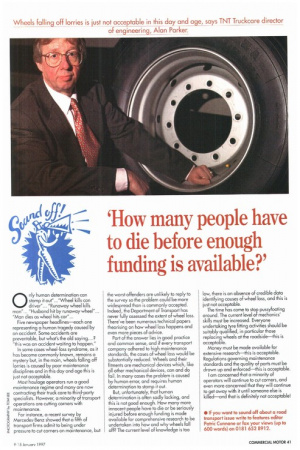'How many people have to die before enough funding is available?'
Page 43

If you've noticed an error in this article please click here to report it so we can fix it.
Wheels falling off lorries is just not acceptable in this day and age, says TNT Truckcare director of engineering, Alan Parker.
0 nly human determination can stamp it out"...'Wheel kills can driver"... "Runaway wheel kills man"... "Husband hit by runaway wheel"... "Man dies as wheel hits car"...
Five newspaper headlines—each one representing a human tragedy caused by an accident. Some accidents are preventable, but what's the old saying....? "this was an accident waiting to happen." In some cases wheel-loss syndrome, as it has become commonly known, remains a mystery but, in the main, wheels falling off lorries is caused by poor maintenance disciplines and in this day and age this is just not acceptable. Most haulage operators run a good maintenance regime and many are now
contracting their truck care to third-party 8 specialists. However, a minority of transport ioperations are cutting corners with -°: maintenance.
± For instance, a recent survey by
6 Mercedes-Benz showed that a fifth of 6'2 transport firms admit to being under
I pressure to cut corners on maintenance, but the worst offenders are unlikely to reply to the survey so the problem could be more widespread than is commonly accepted. Indeed, the Department of Transport has never fully assessed the extent of wheel loss. There've been numerous technical papers theorising on how wheel loss happens and even more pieces of advice. Part of the answer lies in good practice and common sense, and if every transport company adhered to high maintenance standards, the cases of wheel loss would be substantially reduced. Wheels and their fitments are mechanical devices which, like all other mechanical devices, can and do fail. In many cases the problem is caused by human error, and requires human determination to stamp it out. But, unfortunately, that human determination is often sadly lacking, and this is not good enough. How many more innocent people have to die or be seriously injured before enough funding is made available for comprehensive research to be undertaken into how and why wheels fall off? The current level of knowledge is too low, there is an absence of credible data identifying causes of wheel loss, and this is just not acceptable. The time has come to stop pussyfooting around. The current level of mechanics' skills must be increased. Everyone undertaking tyre fitting activities should be suitably qualified, in particular those replacing wheels at the roadside—this is acceptable. Money must be made available for extensive research—this is acceptable. Regulations governing maintenance standards and the quality of parts must be drawn up and enforced—this is acceptable. I am concerned that a minority of operators will continue to cut corners, and even more concerned that they will continue to get away with it until someone else is killed—and that is definitely not acceptable!
• If you want to sound off about a road transport issue write to features editor Patric Cunnane or fox your views (up to 600 words) on 0181 652 8912.
































































































